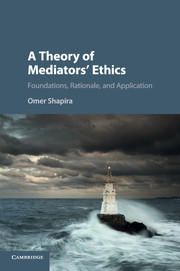Book contents
- Frontmatter
- Dedication
- Contents
- List of figures
- List of tables
- Preface
- Abbreviations of codes of conduct
- PART I A theory of professional ethics
- PART II A theory of mediators’ ethics
- PART III Dealing with ethical problems
- 15 Ethical decision-making
- 16 Case illustrations
- Appendix I A proposed model code of conduct for mediators
- Appendix II Model standards of conduct for mediators (2005)
- Bibliography
- Index
16 - Case illustrations
from PART III - Dealing with ethical problems
Published online by Cambridge University Press: 05 March 2016
- Frontmatter
- Dedication
- Contents
- List of figures
- List of tables
- Preface
- Abbreviations of codes of conduct
- PART I A theory of professional ethics
- PART II A theory of mediators’ ethics
- PART III Dealing with ethical problems
- 15 Ethical decision-making
- 16 Case illustrations
- Appendix I A proposed model code of conduct for mediators
- Appendix II Model standards of conduct for mediators (2005)
- Bibliography
- Index
Summary
Introduction
The purpose of this chapter is to demonstrate the usefulness of the theory of mediators’ ethics in the analysis of ethical questions, and to illustrate the ethical guidance it can offer in difficult cases. The discussion will be of particular interest to mediation practitioners, members of mediator ethics committees, and mediation scholars. Five case scenarios have been drawn from a variety of sources, including questions that were referred to a community mediation center's ethics forum (committee), which I head, opinions published by mediator ethics committees in court-connected mediation programs, ethical dilemmas on the American Bar Association Dispute Resolution Section site, and cases and commentaries from Ellen Waldman's casebook on mediation ethics. The number of cases selected for discussion is not larger for reasons of space, but the theory may be similarly applied to other cases raising ethical questions for mediators. The ethical issues that were chosen for discussion are only a sample of the many ethical questions that come up in mediation practice. They seemed to me, however, questions that many readers will relate to, and their discussion will hopefully enable readers to apply the theory to other cases as well.
Applying theory to practice as illustrated by this chapter serves to highlight the potential contribution of the theory of mediators’ ethics to ethical discourse in the field of mediation. As the following discussion of the cases shows, the theory provides a reasoned normative basis for the examination of ethical questions in mediation that may be useful when no code of conduct for mediators applies to the mediator, or when an applicable code exists but needs to be interpreted. The theory organizes the norms of mediators’ ethics in an accessible way, enabling mediators/members of ethics committees/commentators to orient themselves and focus on the relevant ethical standards; it provides a detailed explanation of the meaning of the ethical norms that apply to mediators, enabling the reader to apply them to factual scenarios; it exposes the rationale behind the norms of mediators’ ethics, and therefore behind the provisions of many codes of conduct for mediators that are silent on that point, enabling the reader to better understand the obligations of mediators and reconcile tensions between these obligations; and it provides a common ethical basis for evaluating, justifying, and criticizing mediator interventions or advocated courses of action of advisory ethics committees and commentators.
- Type
- Chapter
- Information
- A Theory of Mediators' EthicsFoundations, Rationale, and Application, pp. 364 - 396Publisher: Cambridge University PressPrint publication year: 2016



